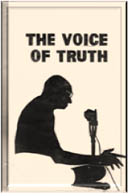
P.O. SEVAGRAM, DIST.WARDHA 442102, MS, INDIA. Phone: 91-7152-284753
FOUNDED BY MAHATMA GANDHI IN 1936
THE SELECTED WORKS OF MAHATMA GANDHI
Vol-5 : Voice of Truth

VOICE OF TRUTH
from
Selected Works of Mahatma Gandhi
Volume V
Written by : M. K. Gandhi
Table of Contents
PART I : SOME FAMOUS SPEECHES
- Benaras Hindu University Speech
- Statement in the The Great Trial of 1922
- On the Eve of Historic Dandi March
- Speech At The Round Table Conference
- The ‘Quit India’ Speeches
- Speech Before Inter-Asian Relations Conference
- Speech On The Eve Of The Last Fast
PART II : SELECTIONS
- SECTION I : TRUTH, WORLD AND MAN
- SECTION II : MEANS AND ENDS
- 7. Means and Ends
- 8. The Meaning of Non-violence
- 9. The Law of Human Species
- 10. The Power of Non-Violence
- 11. Qualities of Votaries of Non-violence
- 12. Non-Violence and Cowardice
- 13. What is Satyagraha
- 14. Qualifications and Training of a Satyagrahi
- 15. Non-co-operation
- 16, Civil Disobedience
- 17. Fasting in Satyagraha
- 18. Satyagrahi Leader
- 19. Satyagraha in The Face of Riots and Aggression
- SECTION III : COMPARATIVE IDEOLOGIES
- SECTION IV : ONE WORLD
- SECTION V : RELIGION AND CULTURE
- SECTION VI : ART, LITERATURE AND SCIENCE
- SECTION VII : ECONOMIC IDEAS
- 35. Economics and Ethics
- 36. Supremacy of Man : Full Employment
- 37. Plain Living and High Thinking
- 38. Dignity of Labour : Bread Labour
- 39. Swadeshi
- 40. Economic Equality
- 41. Decentralised Economy
- 42. Village Communities
- 43. Self-Sufficiency
- 44. Co-operation
- 45. Trusteeship
- 46. The Evil of Industrialism
- 47. The Place of Machinery
- 48. Khadi and Hand-Spinning
- 49. Village Industries
- SECTION VIII : LABOUR RELATIONS
- SECTION IX : POLITICAL IDEAS
- 55. Politics and Religion
- 56. The State of Enlightened Anarchy
- 57. The Individual is Supreme
- 58. Swaraj
- 59. True Democracy
- 60. Decentralisation
- 61. Village Panchayats
- 62. Parliamentary Democracy
- 63. Franchise and Voters
- 64. The Seat of Real Power
- 65. Legislatures
- 66. Majority and Minority
- 67. A Code of Conduct for Governors and Ministers
- 68. The Popular Ministers
- 69. The Police, Crimes and Jails
- SECTION X : SOCIAL IDEAS
- SECTION XI : BASIC EDUCATION AND STUDENTS
- SECTION XII : UNTO THIS LAST
- Glossary
- Sources
About This Book
Written by : M. K. Gandhi
General Editor : Shriman Narayan
First Edition :10,000 copies, February 1959
I.S.B.N :81-7229-008-X
Published by : Shantilal H. Shah
Navajivan Trust,
Ahemadabad-380014
India
Printed by : N. M. Kothari at Rang Bharati,
Todi Estate,
Sun Mill Compound,
Lower Parel,
Bombay-400013
India
© Navajivan Trust, 1969
Download
SECTION IX : POLITICAL IDEAS
Chapter- 56. The State of Enlightened Anarchy
To me political power is not an end but one of the means of enabling people to better their condition in every department of life. Political power means capacity to regulate national life through national representatives. If national life becomes so perfect as to become self-regulated, no representation becomes necessary. There is then a state of enlightened anarchy. In such a state everyone is his own ruler. He rules himself in such a manner that is never a hindrance to his neighbour. In the ideal state therefore, there is no political power because there is no State. But the ideal is never fully realized in life. Hence the classical statement of Thoreau that that Government is best which governs the least.
Young India, 2-7-31, p. 162
Legislation imposed by people upon themselves is non-violence to the extent it is possible in society. A society organized and run on the basis of complete non-violence would be the purest anarchy....
Yes. It is realizable to the extent non-violence is realizable. That State is perfect and non-violent where the people are governed the least. The nearest approach to purest anarchy would be a democracy based on non-violence.
Harijan, 21-7-40, p. 211
A Government cannot succeed in becoming entirely non-violent, because it represents all the people. I do not today conceive of such a golden age. But I do believe in the possibility of a predominantly non-violent society. And I am working for it.
Harijan, 9-3-40, p. 31
It needed the perseverance and genius of so many generations of scientists to discover the laws of electricity, but today everybody, even children use electric power in their daily life. Similarly, it will not always need a perfect being to administer an ideal State once it has come into being. What is needed is a thorough social awakening to begin with. The rest will follow.
Towards New Horizons, (1959), p. 93
There remains the question as to whether in an ideal society, there should be any or no government. I do not think, we need worry ourselves about this at the moment. If we continue to work for such a society, it will slowly come into being to an extent, such that the people can benefit by it. Euclid’s line is one without breadth, but no one has so far been able to draw it and never will. All the same, it is only by keeping the ideal line in mind that we have made progress in geometry. What is true here is true of every ideal.
Harijan, 15-9-46, p. 309